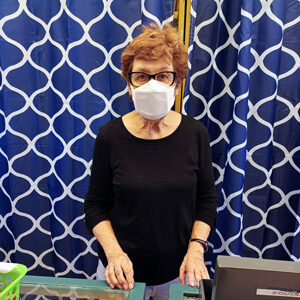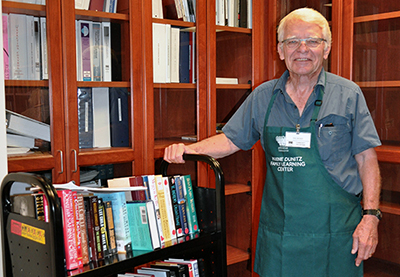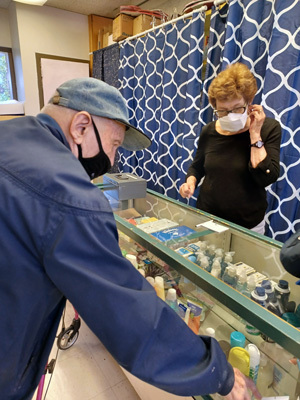Why People From Many Generations Choose to Volunteer at the Los Angeles Jewish Home


Why People From Many Generations Choose to Volunteer at the Los Angeles Jewish Home
There is no one single secret ingredient to the Los Angeles Jewish Home’s success. Our extraordinary staff, talented administrators, trailblazing board members, and generous donors all play a critical role in creating the kind of warm, nurturing, supportive environment that has earned the Jewish Home its stellar reputation nationwide.
However, one bit of Jewish Home magic deserves special attention: its incredibly dedicated cadre of volunteers, who tirelessly give of themselves—day in and day out—to improve the lives of the seniors we are so privileged to serve.

At the Jewish Home, volunteering is central to our mission and to the smooth operation of our daily schedule. Volunteers hail from different places (some are loved ones of current or former Jewish Home residents; others are community members who have heard about our work and are excited to join in to help), but they share a common interest and intention, says Stacy Orbach, the Jewish Home’s director of volunteer services.
"No matter how they come to us, our volunteers are so grateful for the services we provide to seniors. They understand how much elderly men and women have done for our community, and they are eager to show their appreciation by giving back," she says.
Volunteers participate in the life of the Jewish Home in a myriad of ways, from reading to residents, to troubleshooting their technology issues, to assisting with special events. Many bring in their certified therapy dogs to visit with residents and enhance their emotional well-being. Others help lead our growing music therapy program, or simply play an instrument and bring it with them to the Home to share their skill with a deeply grateful audience. Another area of participation for volunteers is our intergenerational programming, which enables kids to spend time with our residents and delight them with their youthful vigor, as the younger generation learns so very much from the seniors.

During the initial stages of the pandemic, we had to put a temporary pause on allowing volunteers onto Jewish Home campuses; securing the health of residents is always our top priority. Now, as the ongoing health safety protocols remain in place, we are ready to welcome volunteers back on campus. Volunteers must be vaccinated and have received at least one booster.
Even when COVID-19 necessitated isolation, there was another population of volunteers who did not have to vacate the Jewish Home premises: our residents themselves! Many of them spend a portion of their day volunteering in a broad range of capacities, from the mailroom to the arts and crafts studio, to our active Resident Councils.
Resident Robert Lehman is just one example. After arriving at the Jewish Home in 2011, he discovered that volunteering helped him put his own challenges in perspective.
"When I first got to the Home, I was focused on my own health issues, but then I realized there are so many people here in need of more assistance than I am," he recalls. "Volunteering helped me forget about my own troubles and concentrate instead on uplifting other residents as I worked to meet their various needs."
Robert’s volunteer efforts have included serving as President of one of the Jewish Home’s Resident Councils. In that capacity, he would meet each week with Jewish Home staff to address his fellow residents’ questions and concerns.
"The council was a vehicle for residents to express their needs and requests, and I am so grateful they confided in me and enabled me to serve them," Robert says. "I did my best to make everybody comfortable, and I worked hard to get people the ‘yes’s’ they were hoping for!"

Stacy points out that, whether they are residents or community members, volunteers make a crucial contribution at the Jewish Home. "Some of our residents can feel isolated from time to time, and volunteers help them feel they’re no longer alone," she says. "In addition to their able minds and bodies, our volunteers bring us unconditional love, which is the greatest gift we could possibly ask for."
To learn more about volunteer opportunities at the Jewish Home, contact Stacy Orbach at (818) 774-3219 or [email protected].